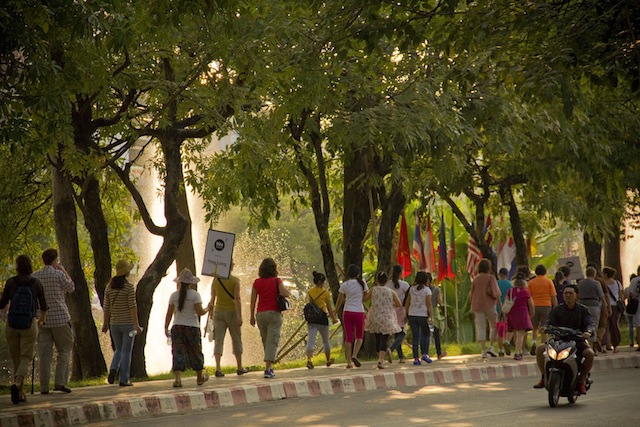By: Kimberly L. Bryant
Running a functional non-profit organization in South East Asia can be an arduous undertaking full of ups and downs, triumphs and challenges. Between dealing with cultural differences, little or no income, and ensuring that the foundation is actually helping, rather than hindering the local situation there is much to consider. It quickly becomes clear that sincere motivation and long-term dedication are fundamental requirements to delving into this line of work.

One woman making it all happen is Ursula Cats, the founder and director of the We Women Foundation. Originally from the Netherlands, this bubbly drama therapist found her true calling after meeting the beautiful women of Myanmar during a trip to Burma years ago. Their bright, hopeful character shined through despite the myriad hardships they were facing.
Cats understood that it would be fruitless to attempt to work within Burma, as she would be endangering anyone who chose to speak with her. She quickly ascertained that northern Thailand would provide her with a more appropriate base of operations in an area that was also in dire need of support: the Shan refugees here live in such uncertainty, their basic needs for safety often going unmet, with too few people supporting their plight. When Cats realized how deeply passionate she felt about helping their cause, she returned home to earn a Master’s degree in anthropology in order to thoroughly research the multi-layered situation concerning the Shan refugees in northern Thailand.

The issues refugees face here are plentiful. Though they have been forced to flee the violence and insecurity of their home country, Thailand still deems them illegal refugees, meaning they have little, if any, rights. There is a small selection of incredibly low-wage, manual labor jobs they are allowed to hold. Since the women are in an inherently insecure situation, their employers can easily take advantage by forcing them to work long hours for almost no money. Moreover, their homes are also controlled by their employers: most of the refugees live in employer-provided housing, in extremely cramped quarters that make daily living an uncomfortable struggle. The most a Shan woman might earn here is 5000 THB per month, the equivalent of $150 USD; the majority earn far less.
And yet, in spite of the circumstances that these women find themselves in through no fault of their own, they are positive and upbeat in character, the picture of hope and determination. When I met them, I instantly understood exactly what Cats meant when she started tearing up while speaking about her admiration for the women with whom she works and devotes her life to.
For these highly intelligent, motivated Shan women, We Women is a safe, supportive, and fun space in their world of instability, insecurity, and vulnerability. Created in 2009, the foundation focuses primarily on promoting education, based on the idea that higher education has a vast ripple effect: the benefits of one strong women attending university can affect thousands of others for years to come.

With the goal of molding Myanmar’s future female leaders and educators, We Women chooses a small number of students each year to take under their wing. This includes providing full tuition, room and board for the university and program of their choice; one-on-one personal coaching sessions with Cats; a supportive, safe community with other high-achieving women; and evening classes with high quality teachers. And these are just some of the aspects of the organization — there are numerous other opportunities and benefits on offer, which shift depending on the changing needs of the Shan women.
Cats’ theoretical background provides the academic groundwork for We Women; she and her team are devoted to engaging in ongoing, critical research about the many complex variables in play within this environment. Her constant re-assessment of the situation for the Shan refugees living in northern Thailand is one of the many ways she ensures that We Women is doing its best to meet the needs of the women it desires to help. This ability to shine a critical light on her own work, through the lenses of academia and field research is invaluable when it comes to the success of We Women.

We Women also has several interns who help Ursula steer the ship– particularly when she’s back in Europe– including San, 26, and Yanaden, 22. Both from Myanmar, these women are not only interns but also students who participate in We Women’s classes and in coaching sessions with Cats. Reading Cats’ MA thesis on the subject quickly shows her emotionally intimate relationship with the women of Myanmar. Her research is based on a holistic approach that focuses on psychological aspects, including how the women feel because of their vulnerable situation and how they might be able to move forward in achieving their dreams.
Last weekend, I walked in solidarity with a group of more than 50 supporters that included Westerners, Thais, and women from Myanmar. We marched along in tandem, making happy conversation with new friends, and armed with signs displaying our purpose — to raise both money and awareness for refugee Ying Long, so she could attend university and subsequently give back to her own community. Such is the premise behind all of We Women’s endeavors: to empower the women themselves to become change-makers for the future of Myanmar. Cats has no doubt that every woman her foundation reaches has the potential to do just that, with a little bit of support.
San and Yanaden radiate light from their strong sense of character; they continue to undergo such challenges, living with a type of insecurity I will never know simply because I was born in Canada. I have no country from which I need to run; I have every opportunity to obtain a work visa if I so choose; I walk on the streets here without feeling the effects of underlying discrimination from Thai locals.

The Shan women are an inspiration to face our challenges with grace and determination and remember to laugh throughout the day, no matter how difficult it feels. I know that the future for these women is extremely bright, because with the help of We Women and other fantastic organizations devoted to this cause, they will be unstoppable. They teach all of us to reach beyond our given circumstances, to live our dreams without exception. No obstacle is too big, no trauma too deep to overcome – by focusing on creating safety and security within ourselves, we can all choose to move forward with our goals. I am honored to continue to watch their progress and share their story.
It is certainly one worth telling.
ABOUT THE PHOTOGRAPHER
 Kimberly Lauren Bryant is a documentary photographer and visual artist currently based in Africa. Originally from Canada, she holds a degree in Visual Arts from the University of British Columbia and is a photography graduate of The Compelling Image. Specializing in creating unique imagery with a focus on bold color and pattern, she finds inspiration in film, art, and everyday life. With interests in travel and visual anthropology, her passion for creative expression shapes who she is and how she interacts with the world. Whilst continuing her long-standing love affair with visual language, Kimberly enjoys soaking up the myriad colors, sounds, and sights on offer around the world.
Kimberly Lauren Bryant is a documentary photographer and visual artist currently based in Africa. Originally from Canada, she holds a degree in Visual Arts from the University of British Columbia and is a photography graduate of The Compelling Image. Specializing in creating unique imagery with a focus on bold color and pattern, she finds inspiration in film, art, and everyday life. With interests in travel and visual anthropology, her passion for creative expression shapes who she is and how she interacts with the world. Whilst continuing her long-standing love affair with visual language, Kimberly enjoys soaking up the myriad colors, sounds, and sights on offer around the world.




